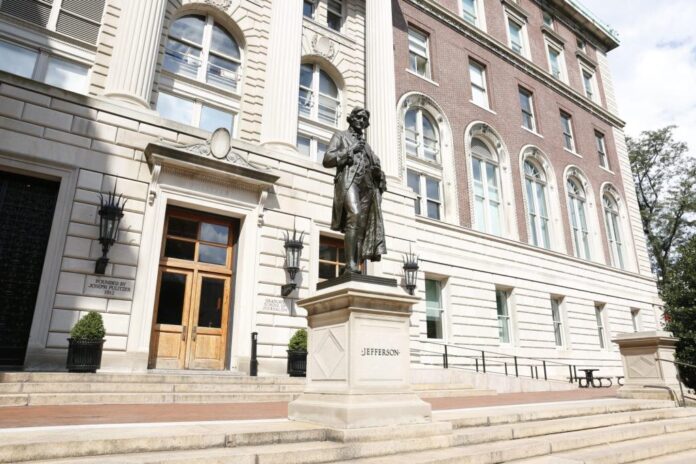
New York’s City Council, having already removed the statue of Thomas Jefferson from City Hall, now wants to take down all statuary of George Washington and Christopher Columbus.
(Is the city of Washington and the district in which it is located next?)
This is part of a campaign to get rid of monuments honoring anyone who owned enslaved people or profited from slavery.
It also includes anyone who “participated in systematic crimes against indigenous people or other crimes against humanity.”
It does not require a balancing of these sins and crimes against the good deeds and virtues of those honored.
George Washington did benefit from slavery, although he emancipated his own slaves upon his death.
But what he accomplished for other people changed the face of America for the better.
There probably wouldn’t have been a United States of America were it not for Gen. Washington.
He demanded equal rights for those of all religious persuasions, sending letters to the leaders of various denominations.
“The citizens of the United States of America have a right to applaud themselves for having given to mankind examples of an enlarged and liberal policy: a policy worthy of imitation. All possess alike liberty of conscience and immunities of citizenship,” he wrote to the Jews of Newport, RI.
“It is now no more that toleration is spoken of, as if it was by the indulgence of one class of people, that another enjoyed the exercise of their inherent natural rights. For happily the government of the United States, which gives to bigotry no sanction, to persecution no assistance, requires only that they who live under its protection should demean themselves as good citizens in giving it on all occasions their effectual support.”
This was the first time in history a nation’s leader proclaimed equal rights for its Jewish citizens.
Certainly, that and his other good deeds should be part of any calculus in evaluating America’s first president.
On the other side of the scale are black leaders such as Malcolm X, who did considerable good in energizing African-American citizens but whose long history of blatant antisemitism continues to have a negative impact today on black and other radicals.
Should the names of streets honoring him be changed?
There must be a single standard of evaluation when it comes to taking down monuments and street names, difficult as it would be to agree on any principled standard.
Consider, for example, President Franklin Delano Roosevelt, who has an island named after him.
He did a great many good things, but his failures were monumental and costly.
They include maintaining racial segregation in our armed forces while thousands of young African Americans were sent into battle defending democracy.
He closed the doors to Jewish immigration before and during the Holocaust, deliberately making it difficult for Jewish refugees even to fill the unused “quotas” authorized by law.
He is personally responsible for the deaths of many Jews who could have been saved had Roosevelt simply followed the law rather than pandered to the antisemites in Congress and the State Department.
History is filled with these complexities.
Thomas Jefferson’s views on slavery were complex. Abraham Lincoln’s views on the rights of African Americans were likewise complicated.
Woodrow Wilson was a man of peace but a virulent racist.
We have no objection to one of the alternatives the City Council proposes: adding an “explanatory plaque” to any monument not taken down, explaining both the misdeeds and the good deeds of the historical figure — so long as the explanation is historically accurate, fair and nuanced.
But radicals determined to shape the narrative in accordance with their particular ideologies don’t want accuracy, fairness, and nuance.
Nor can academic historians necessarily be trusted. Too many of them use and abuse history to promote their ideological, political, and racial agendas.
Let the marketplace of ideas determine the legacies of past historical figures.
Websites should be provided near the monuments in which conflicting views could be shared and debated.
That is the American way, especially since even the explorer after whom our continent is named had a complex legacy!
The City Council should be uniting New Yorkers and Americans around critical issues of crime, fentanyl abuse, immigration, and the economy — it should not be focused on divisive issues of the past.
Alan Dershowitz is professor emeritus at Harvard Law School. Andrew Stein served as New York City Council president, 1986-94.



